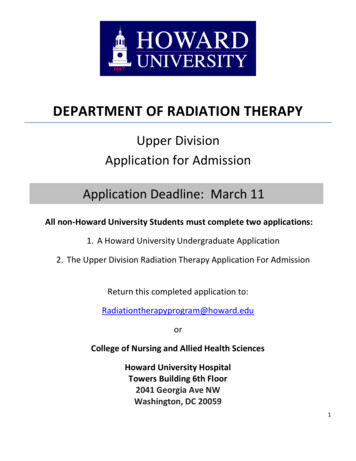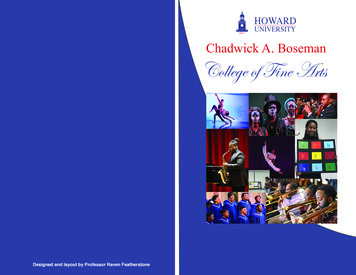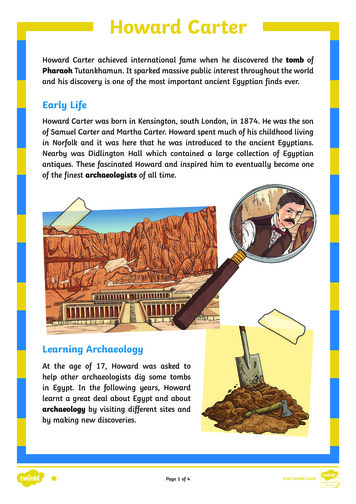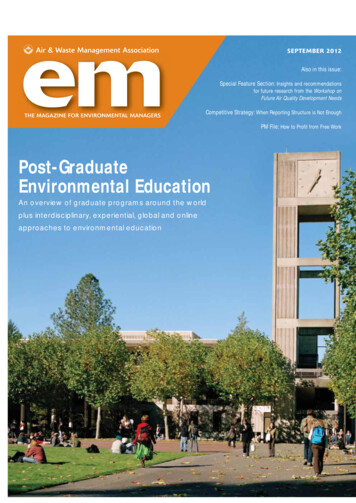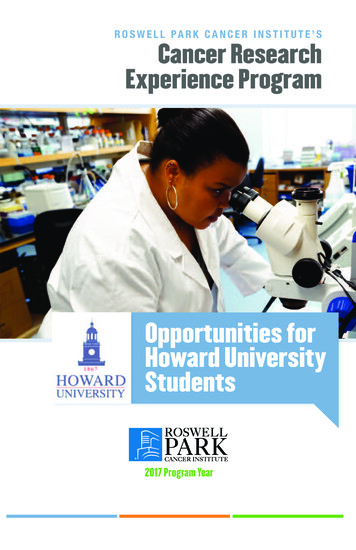
Transcription
R O S W E L L PA R K C A N C E R I N S T I T U T E ’ SCancer ResearchExperience ProgramOpportunities forHoward UniversityStudents2017 Program Year
THE ROSWELL PARK/HOWARD UNIVERSITY CANCER SCHOLARS PROGRAMRoswell Park Cancer Institute in Buffalo, N.Y. is America's first cancer center anda National Cancer Institute-designated Comprehensive Cancer Center conductingclinical care, research, education, and community outreach. The mission of RoswellPark Cancer Institute is to “understand, prevent, and cure cancer.”Howard University students accepted into the one of the Roswell ParkInternship Programs will: deeply explore their interest in cancer under the direction of active researchers at a leadingComprehensive Cancer Center; prepare for graduate education in the cancer sciences by reading cutting-edge scientificliterature, participating in an intensive hands-on research experience, developing scientificcommunication skills, and experiencing the “bench-to-bedside” continuum of moderntranslational research; understand and become empowered to address issues of cancer health disparity inAfrican-American and other underserved communities; and learn about the variety of career pathways and research areas within the cancer team, such asprevention, epidemiology, cancer biology, therapeutics development and clinical research.1
School Year Research Tele-mentorship:Howard University students participate in an academic year tele-mentorship with an RPCI facultyTMresearch member. Students will read scientific literature relevant to the Roswell Park investigator’sfield of study, including publications from their laboratory. Students will discuss these readings weeklyfor one hour via video chat with the Roswell Park faculty or graduate students and postdoctoral fellowsin their labs. Students will be prepared through this pre-internship learning module to readily integratebackground knowledge into their summer research internship and be productive in their research project.Summer Research Experience Program in Cancer Science Internship:Common to all three research experience programs is the “Summer Research Experience ProgramRIin Cancer Science.” This is a 10-week summer research internship program hosted at RoswellPark Cancer Institute. Students conduct a research project under the mentorship of their RPCI researchfaculty member and his/her laboratory staff. This core research experience is supported by curricular andprofessional development activities. The internship culminates in a cap-stone scientific talk and posteron the intern’s summer research project which they present to their fellow interns, faculty and staffat a concluding program-wide summer scientific conference.R O S W E L L PA R K C A N C E R I N S T I T U T E ’ SCANCER RESEARCH EXPERIENCE PROGRAMS:TMHoward Cancer Scholars Program . . . . . . . . . . . . . . . . . . . . . . . . . . . . . . 3RIFor Honors Program Sophomores interested in cancer scienceTMHoward Prostate Cancer Scholars Program . . . . . . . . . . . . . . . . . . . . . . . 5RI For Honors Program Sophomores and non-Honors Juniors interested in prostate cancer scienceRI Summer Research Experience Program in Cancer Science. . . . . . . . . . . 7For Juniors interested in cancer scienceMentor Index . . . . . . . . . . . . . . . . . . . . . . . . . . . . . . . . . . . . . . . . . . . . . . . 92
PROGRAM OVERVIEW:Howard Cancer Scholars Program:Funded by National Institutes of Health (R25CA181003)Howard University Sophomores enrolled in the Honors Program and majoring in biology can explorea cancer topic in the field of expertise of a Roswell Park Cancer Institute (RPCI) faculty researcheracross a variety of disciplines: cancer cellular and molecular biology, cancer biophysics, cancerepidemiology, cancer pharmacology/therapeutics or tumor immunology. Accepted Scholars developan understanding of their selected research topic through mentored directed readings in preparationfor conducting their own project in an immersive funded summer research internship experience.An Honors student successfully completing this program will satisfy Howard University’s Honorsrequirements and will be able to make an informed decision and competitive application to entera graduate school in preparation for a career in cancer research. Funding support is provided by theNational Institutes of Health (R25CA181003.)ELIGIBILITY REQUIREMENTS:HOWARD CANCER SCHOLARS PROGRAMMentors Available inWho May ApplySophomore Honors StudentsWhen To ApplyOctober of Sophomore shipFunding3Any Cancer FieldU.S. or Permanent Resident of the U.S.3 Semesters of Tele-Mentored Directed Readings I-III Courses Beginning Spring of Sophomore Year10-week Summer Research Internship at Roswell Park between Junior and Senior yearsUse summer research as basis for writing an Honors Thesis 4000 subsistence allowanceApplication DeadlineOctober 30, 2016Details & ms/cancer-scholars-application
fPROGRAM TRACK:1. SOPHOMORE FALL2. SOPHOMORE SPRINGApply online by, October 30, 2016APPLICATION,SELECTION ANDPLACEMENTIdentify which mentors match your interests.Roswell Park and Howard University faculty will placefive Cancer Scholars and match them to mentors.TELE-MENTOREDDIRECTEDREADINGS IComplete Directed Readings I, II, and III courses underthe tele-mentorship of Roswell Park research faculty.2. JUNIOR FALL TELE-MENTOREDDIRECTEDREADINGS IIRead scientific literature relevant to the Roswell Park mentor’sfield of study, including publications from their laboratory.Discuss these readings weekly for one hour via videochat with the Roswell Park faculty or graduate studentsand postdoctoral fellows in their labs.2. JUNIOR SPRINGTELE-MENTOREDDIRECTEDREADINGS III3. JUNIOR SUMMERPAID RESEARCHINTERNSHIP ATROSWELL PARK4. SENIOR YEARPRESENTATIONAT SCIENCECONFERENCE ANDHONORS THESISUpon satisfactory completion of the Directed Readings courses:- Admitted into Roswell Park’s summer research program.- Conduct your honors research project with your mentor.- Present a cap-stone scientific talk and poster on your summerresearch project to intern peers.Present an Honors Thesis based on your Roswell Park research.Summer Internship Funding: You will receive a subsistence allowance of 4000 to cover your summerliving expenses and lodging expenses at Canisius College dormitories for the 10 week duration of the program.Payments are made to interns on a bi-weekly basis during the summer internship period.4
PROGRAM OVERVIEW:Howard Prostate Cancer Scholars Program:Funding support is provided by the Department of Defense (PC131811.)African American men are more likely to develop more aggressive forms of prostate cancer, haveearlier on-set of the disease and succumb to the disease at a higher rate than Caucasians. HowardUniversity Sophomores enrolled in the Honors Program or non-Honors Juniors majoring in biologycan select to be mentored by an RPCI Faculty researcher with prostate cancer expertise to conductan in-depth learning and research experience on prostate cancer which includes a focus on underlyingbiological racial disparities in disease diagnosis and treatment. Accepted Scholars develop anunderstanding of their selected prostate cancer research topic through school year tele-mentorshipwith their RPCI Faculty researcher. These tele-mentored readings will satisfy course requirements ofthe “Directed Readings (I-III)” for Honors students and “Topics in Cell and Molecular Biology” fornon-Honors students. Completion of the tele-mentored readings phase prepares students for a fundedsummer research experience in their mentor’s laboratory at Roswell Park where they will work ontheir own research project. Students will present a poster of their summer research at a nationalconference in their Senior year and receive continued mentorship. Honors students can satisfy HowardHonors requirements by completing all phases of this program. After his/her research experience,a Prostate Cancer Scholar is poised to enter a graduate training program and pursue a career inprostate cancer. Funding support is provided by the Department of Defense (PC131811.)5
ELIGIBILITY REQUIREMENTS:H O W A R D P R O S TAT E C A N C E R S C H O L A R S P R O G R A MMentors Available inProstate CancerWho May ApplySophomore Honors StudentsJuniorsWhen To ApplyOctober of Sophomore YearOctober of Junior shipFundingU.S. or Permanent Resident of the U.S.3 Semesters of Tele-Mentored Directed ReadingsI-III Courses Beginning Spring of Sophomore Year1 Semester of Tele-Mentored Topics in Celland Molecular Biology in Spring of Junior Year10-week Summer Research Internship at Roswell Park between Junior & Senior yearsUse summer research as basis for writing anHonors Thesis. Present research at nationalscientific meetingPresent research at national scientific meeting 6000 stipendApplication DeadlineOctober 30, 2016Details & ms/cancer-scholars-application6
P R O S TAT E C A N C E R S C H O L A R P R O G R A MfPROGRAM TRACK: SOPHOMORE HONORS BIOLOGY MAJORS1. SOPHOMORE FALL2. SOPHOMORE SPRINGApply online by, October 30, 2016APPLICATION,SELECTION ANDPLACEMENTIdentify which prostate cancer mentors match your interests.Roswell Park and Howard University faculty will placefive Cancer Scholars and match them to mentors.TELE-MENTOREDDIRECTEDREADINGS IComplete Directed Readings I, II, and III courses underthe tele-mentorship of Roswell Park research faculty.2. JUNIOR FALL TELE-MENTOREDDIRECTEDREADINGS IIRead scientific literature relevant to the Roswell Park mentor’sfield of study, including publications from their laboratory.Discuss these readings weekly for one hour via videochat with the Roswell Park faculty or graduate studentsand postdoctoral fellows in their labs.2. JUNIOR SPRINGTELE-MENTOREDDIRECTEDREADINGS III3. JUNIOR SUMMERPAID RESEARCHINTERNSHIP ATROSWELL PARKWrite & Present an Honors Thesis based on your research.4. SENIOR YEARPRESENTATIONAT SCIENCECONFERENCE ANDHONORS THESIS7Upon satisfactory completion of the Directed Readings courses:- Admitted into Roswell Park’s summer research program.- Conduct your honors research project with your mentor.- Present a cap-stone scientific talk and poster on your summerresearch project to intern peers.Present your research at a national scientific conferenceReceive extended advisement from their RPCI faculty mentor on:- preparation of your research poster- preparation of graduate school applications and interviewingfor graduate programs.Summer Internship Funding: You will receive a stipend of 6000 to cover your summer livingexpenses and lodging expenses at Canisius College dormitories for the 10 week duration of the program.Payments are made on a bi-weekly basis during the summer internship period.
P R O S TAT E C A N C E R S C H O L A R P R O G R A MPROGRAM TRACK: NON-HONORS JUNIOR BIOLOGY MAJORS1. JUNIOR FALLAPPLICATION,SELECTION ANDPLACEMENTApply online by, October 30, 2016fIdentify which prostate cancer mentors match your interests.Roswell Park and Howard University faculty will placefive Cancer Scholars and match them to mentors.Complete “Topics in Cellular and Molecular Biology” courseunder the tele-mentorship of Roswell Park research faculty.2. JUNIOR SPRINGTELE-MENTOREDDIRECTEDREADINGS IIIRead scientific literature relevant to the Roswell Park mentor’sfield of study, including publications from their laboratory.Upon satisfactory completion of the“Topics in Cellular and Molecular Biology”:3. JUNIOR SUMMERPAID RESEARCHINTERNSHIP ATROSWELL PARK- Admitted into Roswell Park’s summer research program.- Conduct your honors research project with your mentor.- Present a cap-stone scientific talk and poster on your summerresearch project to intern peers.Present your research at a national scientific conference4. SENIOR YEARPRESENTATIONAT SCIENCECONFERENCE ANDHONORS THESISReceive extended advisement from their RPCI faculty mentor on:- preparation of your research poster- preparation of graduate school applications and interviewingfor graduate programs.Summer Internship Funding: You will receive a stipend of 6000 to cover your summer livingexpenses and lodging expenses at Canisius College dormitories for the 10 week duration of the program.Payments are made on a bi-weekly basis during the summer internship period.8
PROGRAM OVERVIEWS:Summer Research Experience Program in Cancer Science:Funding support is provided by the National Institutes of Health (R25CA181003.)Undergraduate biology/science majors enrolled in their junior year at colleges nationwide may chooseto explore a cancer topic at RPCI in one of several disciplines: cancer cellular and molecular biology,cancer biophysics, cancer epidemiology, cancer pharmacology/therapeutics or tumor immunology.Accepted students receive a funded summer research internship experience in the laboratory ofa selected RPCI faculty researcher. Interns attend curricular and professional development activitiesas part of a formal program to support their core research experience. After his/her summer researchexperience, an intern is able to make an informed decision and competitive application to graduateschool in preparation for a career in cancer research. This program is not specific to Howard Universitystudents; rather Howard applicants compete within a national applicant pool. Funding support isprovided by the National Institutes of Health (R25CA181003.)ELIGIBILITY REQUIREMENTS:SUMMER RESEARCH EXPERIENCE PROGRAM IN CANCER SCIENCEMentors Available inWho May ApplyWhen To nshipFunding9Any Cancer FieldJuniorsJanuary of Junior YearU.S. or Permanent Resident of the U.S.None10-week Summer Research Internship at Roswell Park between Junior and Senior yearsNone 4000 subsistence allowanceApplication DeadlineJanuary 10, 2017Details & ApplicationRoswellPark.edu/education/summer
THE ROSWELL PARK/HOWARD UNIVERSITY CANCER SCHOLARS PROGRAMSummer Research Experience Program in Cancer Science:PROGRAM TRACK:2. JUNIOR SPRINGAPPLICATION,SELECTION ANDPLACEMENTApply online by, January 10, 2017fIdentify which prostate cancer mentors match your interests.The Department of Educational Affairs at Roswell Park CancerInstitute finalizes placement of 20 funded internships froma national pool of applicants.Students admitted to the “Summer Research ExperienceProgram in Cancer Science.”3. JUNIOR SUMMERPAID RESEARCHINTERNSHIP ATROSWELL PARKPresent your research at a local scientific conferenceSummer Internship Funding: You will receive a subsistence allowance of 4000 to cover your summerliving expenses and lodging expenses at Canisius College dormitories for the 10 week duration of the summerinternship program. Payments are made to interns on a bi-weekly basis during the summer internship period.10
MENTOR DIRECTORYAvailable mentors and their research profiles:The following Roswell Park Cancer Institute researchers have volunteered to participate as mentors toHoward University students accepted into the “Howard Prostate Cancer Scholar” and “Howard CancerScholar” programs. These mentors and their laboratory staff will tele-mentor on pertinent scientificliterature, supervise the summer research internship and provide extended mentoring activities.Mentors in the directory are categorized by their department affiliation. Highlighted in each mentor’sprofile is their availability to serve as a mentor in the “Howard Prostate Cancer Scholars Program”or “Howard Cancer Scholars Program.” Eligible Howard students will indicate on the applicationthe program for which they wish to be considered: “Howard Cancer Scholars,” “Howard ProstateCancer Scholars” or both. Students applying to ONLY the “Howard Cancer Scholars” program may indicate on theapplication their preferences for any mentors listed as “Available to mentor in the HowardCancer Scholars Program.” Students applying to ONLY the “Howard Prostate Cancer Scholars” program must indicateon the application their preferences ONLY for mentors listed as “Available to mentor in theHoward Prostate Cancer Scholars Program.” Students applying to BOTH the “Howard Cancer Scholars” and “Howard Prostate CancerScholars” should indicate at least TWO preferred mentors from among those listed as“Available to mentor in the Howard Prostate Cancer Scholars Program.”Note: A Directory of Mentors for the “Summer Research Experience Program in Cancer Science” is not includedhere but will be available on-line (www.roswellpark.edu/education/summer) beginning in December after mentorshave registered.CSPS11Available to mentor in the Howard Cancer Scholars ProgramAvailable to mentor in the Howard Prostate Cancer Scholars Program
MENTOR DIRECTORYCANCER GENETICSMentor: Joyce Ohm, PhDAssistant Professor of OncologyCSResearch Interests: My laboratory is actively investigating how both geneticand environmental determinants may reprogram the epigenome and contribute to tumor initiation and progression. I currently have an NIH RO1 grantfocused on epigenomic remodeling in stem cells and differentiated neuralcells following exposures to environmental toxicant exposure as well as an ongoing program looking at epigenetic reprogramming in translocation associated soft-tissue sarcomas. My research lab regularly performs –omics levelmolecular analysis of normal, pre-malignant, and malignant cell populationsincluding RNA-sequencing, ChIP-sequencing, and global methylation analysis,all of which are key elements of my ongoing research. Our long term goals areto identify novel therapeutic strategies for the treatment of aggressive humancancers based on their molecular profiling.Mentor: Irwin Gelman, PhDProfessor of OncologyMember Graduate Faculty, Roswell Park Graduate Division,University at BuffaloCSResearch Interests: My research interests revolve around understandinghow tyrosine kinases regulate signaling and cytoskeletal pathways underconditions of cell adhesion and motility, response to growth factors, andoncogenic transformation. The research projects in my lab have a specialfocus for biologies of cancer recurrence and/or metastasis (cell culture andmouse models), with a special emphasis on identifying and characterizinggenes that regulate the aggressive behavior of cancer cells. The translationalimpact of these projects is in their use of clinical tissue, genomic and medicalinformatics data to stratify basic scientific findings with predictive clinicaloutcomes or to identify new therapeutic targets of advanced, metastaticbreast and prostate cancer.12
MENTOR DIRECTORYC A N C E R P R E V E N T I O N A N D P O P U L AT I O N S C I E N C E SMentor: Maciej Goniewicz, PhD, PharmDAssistant Professor of OncologyResearch Interests: Dr. Goniewicz’s primary research area is in nicotinepharmacology, with a focus on nicotine dependence and smoking cessation.He has research experience in smoking cessation behavioral treatment,pharmacotherapy, and pharmacokinetics in both clinical and communitybased settings. Dr. Goniewicz’s current research is focused on newnicotine-containing products and alternative forms of tobacco. He examinessafety and efficacy of electronic nicotine delivery devices, commonly callede-cigarettes. These studies include the laboratory evaluation of the products,pharmacological and toxicological assessment, surveys among their users,and their potential application in harm reduction and smoking cessation.He also evaluates implementation of new tobacco control laws and role ofcommunity pharmacists in smoking cessation.CSCELL STRESS BIOLOGY & IMMUNOLOGYMentor: Sandra Gollnick, PhDMember, Department of Cell Stress BiologyDistinguished Professor, Department of ImmunologyMember Graduate Faculty, Roswell Park Graduate Division,University at BuffaloCS13PSResearch Interests: Dr. Gollnick’s research focuses on the yin and yang ofinflammation in the progression and treatment of cancer. Chronic inflammation contributes to the development and progression of many cancers, including prostate cancer. Dr. Gollnick’s laboratory explores how tumor cells co-optthe host immune system to promote chronic inflammation that leads to increased vascularization, suppression of anti-tumor immunity and increasedtumor cell proliferation and migration. The goal of this work is to develop noveltherapeutic targets based on increased understanding of the interaction oftumor cells and immune cells. Unlike chronic inflammation, acute inflammation promotes the development of anti-tumor immunity. Many anti-cancermodalities, including radiation, chemotherapy and photodynamic therapy(PDT), result in acute inflammation. PDT is an FDA approved anti-cancermodality used for the elimination of early disease and palliation of late stagemalignancies. Dr. Gollnick’s laboratory has shown that PDT stimulates antitumor immunity that is capable of combating distant disease. Her currentfocus is on developing clinical protocols for the treatment of head and neckand lung cancers with a goal of providing enhanced tumor control, includingcontrol of metastases, with minimal effect of quality of life.
MENTOR DIRECTORYIMMUNOLOGYMentor: Elizabeth Repasky, PhDProfessor of OncologyThe Dr. William Huebsch Professorship in ImmunologyMember Graduate Faculty, Roswell Park Graduate Division,University at BuffaloCSResearch Interests: Dr. Repasky’s research program focuses on explorationof physiological (homeostatic) responses which can be manipulated to alterthe tumor microenvironment and improve the efficacy of cancer therapies,including immunotherapies. For her research, she has helped to developimproved mouse models for testing novel therapies. A large amount of efforthas been placed on understanding the role of body temperature on anti-tumorimmune activity and on vascular function.Mentor: Sharon Evans, PhDProfessor of OncologyMember Graduate Faculty, Roswell Park Graduate Division,University at BuffaloCSResearch Interests: The overarching goal of our research program is to investigate the molecular mechanisms that control lymphocyte trafficking acrossblood vessel walls which are important checkpoints in the development of afine-tuned adaptive immune response. These studies are particularly relevantto cancer immunotherapy since it is now recognized that the extent of T cellinfiltration at tumor sites is a critical determinant of patient responses to immune-based therapies as well as standard chemotherapy and radiation.14
MENTOR DIRECTORYIMMUNOLOGYMentor: Joseph Barbi, PhDAssistant Professor of OncologyCSResearch Interests: In order for the immune system to function properly,it must be tightly regulated. Failure to do so can inappropriately unleash theimmune system’s impressive destructive power. Preventing the collateraldamage and autoimmune disease that can result form out-of-control immuneactivation are a number of safeguards including Regulatory T cells. Whilethese are necessary for immune control, they can also oppose the mountingof robust anti-tumor immune responses, limiting the benefits of many anticancer therapies. My research interests focus on the factors and processesthat influence Regulatory T cells and other mechanisms of immune control.My lab is exploring the regulatory cell types and processes capable of controlling the immune system with an emphasis on unappreciated factors that mayenhance or inhibit their suppressive functions. By advancing our understanding of how certain environmental cues, inflammatory stresses, and metabolicfactors influence the mechanisms of immune regulation we will discoveryways to fine-tune immune responses and reveal new targets for future anticancer immunotherapies.Mentor: Scott Abrams, PhDProfessor of OncologyMember Graduate Faculty, Roswell Park Graduate Division,University at BuffaloCS15Research Interests: Our research interests have been devoted to understanding how the immune system achieves or fails to achieve a successfulantitumor response. More specifically, our work focuses on mechanisms oftumor escape, immune suppression and immunotherapy. During the courseof these studies, our laboratory has defined pivotal roles for interferon regulatory factor-8 (IRF8), a member of the IRF family of transcription factors, intumor immunology. Key findings showed that when IRF8 is expressed it actsas a positive regulator of tumor-cell response to certain forms of cell death, aswell as a negative regulator of myeloid-derived suppressor cell (MDSC) development. MDSCs are known to be potent inhibitors of antitumor immunity andtheir production appears to IRF8-dependent. Thus, we have identified previously unrecognized roles for IRF8 in tumor biology. Altogether, our goals areto better understand how the neoplastic process impairs host antitumor immune responses, thereby providing new avenues for prognostic or therapeuticopportunities.
MENTOR DIRECTORYMOLECULAR PHARMACOLOGY AND THERAPEUTICSMentor: Mukund Seshadri, DDS, PhDAssociate Professor of OncologyMember Graduate Faculty, Roswell Park Graduate Division,University at BuffaloCSPSResearch Interests: One of the ongoing projects in the laboratory is focused oninvestigating the therapeutic potential of a novel combination strategy for castration-resistant metastatic prostate cancer (CRMPC). The high mortality rateassociated with CRMPC underscores the critical need to investigate noveltreatment approaches that can improve response rates in this patient population. Using clinically-relevant models, the research project will address severalkey questions of critical importance to the successful clinical translation of thisapproach. To determine the translational potential of this combination strategyfor prostate cancer, we will conduct imaging-guided preclinical trials to characterize the vascular response of tumors to combined androgen deprivationand vascular-targeted therapy. The work is interdisciplinary in nature anddraws on concepts from biophysics, cancer biology, pharmacology and molecular biology and clinical oncology.16
MENTOR DIRECTORYMOLECULAR PHARMACOLOGY AND THERAPEUTICSMentor: Dhyan Chandra, PhDTitle: Associate Professor of OncologyMember Graduate Faculty, Roswell Park Graduate Division, Universityat BuffaloCSPSResearch Interests: The research focus of Dr. Chandra’s laboratory is toidentify and define various mitochondrial regulators of prostate cancer celldeath. He also investigates the underlying mechanisms of prostate cancerhealth disparities among African American and European American men.The ultimate goal of his laboratory is to develop effective agents for prostatecancer therapy by targeting mitochondria.Mentor: Gokul DasAssociate Professor of OncologyMember Graduate Faculty, Roswell Park Graduate Division,University at BuffaloCS17Research Interests: Research in my laboratory focuses on crosstalkbetween estrogen receptors and p53 signaling in breast (luminal andtriple-negative breast cancers), lung (non-small cell lung cancer), and ovarian(high grade serous ovarian cancer) cancers. Inactivation of p53 by multiplemechanisms is a frequent event in these cancers. Estrogen receptors alpha(ERα) and beta (ERβ) have important roles in normal and disease physiologyof these organs. We have shown that both ERα and ERβ bind p53. Bindingof ERα to p53 results in functional inactivation of p53, whereas ERβ-p53interaction elicits context-dependent effects in cancer cells. We activelypursue opportunities to translate findings from the laboratory by developinginnovative retrospective and prospective clinical studies. One such prospectiveclinical trial to investigate the role of p53 and ERα in breast cancer resistanceto tamoxifen therapy is currently underway.
MENTOR DIRECTORYUROLOGIC ONCOLOGYYue Wu, PhDAssistant Professor of OncologyDepartment of UrologyMember, Graduate Faculty Roswell Park Graduate Division,University at BuffaloCSPSResearch Interests: My research interest is in androgen metabolismand androgen receptor signaling in prostate cancer. Specifically, hisresearch projects are focused on prostatic androgen trafficking andmetabolism by prostatic epithelial cells and cancer cells, and howandrogen metabolism affects biology and clinical characteristics ofprostate cancer. The ultimate goal is to delineate mechanisms underlyingthe progression of prostate cancer to castration recurrent disease, andto identify novel modalities to prevent or treat castration recurrentprostate cancer.18
FUNDING SU PPORT:The “Howard Cancer Scholars Program” and the“Summer Research Experience Program in Cancer Science”are supported by funding from the National Cancer Institute of theNational Institutes of Health under award number: R25CA181003.The “Howard Prostate Cancer Scholars Program” is supported by fundingfrom the Department of Defense under award number: PC131811Elm & Carlton Streets Buffalo, New York 14263www.RoswellPark.org1-877-ASK-RPCI (1-877-275-7724)A National Cancer Institute-Designated Comprehensive Cancer Center A National Comprehensive Cancer Network MemberA Blue Distinction Center for Complex and Rare Cancers A Blue Distinction Center for Transplants 30195 (8/16)
Application Deadline October3 0,2 16 Details & Application R osw e lP ark. d u / c ti nm - pg h. 4 1. SOPHOMORE FALL APPLICATION, SELECTION AND PLACEMENT 2. SOPHOMORE SPRING . expenses and lodging expenses at Canisius College dormitories for the 10 week duration of the program. Payments are made on a bi-weekly basis during the summer .

